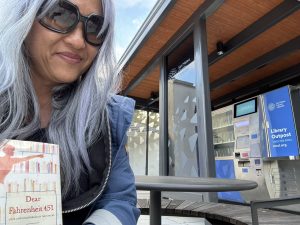
Me holding a book: Dear Fahrenheit 451 at an outpost in Pacifica, CA.
Stories matter because they tap into emotion, help us remember, and motivate us to act. In my last reflection, I discussed a concept—originally a best practice from the restaurant world—that can be adapted to libraries: dreamweaving unforgettable experiences. Will Guidara of Eleven Madison Park (EMP) hires Dreamweavers whose job is to “pull legends”—creating stories for patrons to share. If people were coming to us to add to their collection of experiences, then we saw these not as extra flourishes but as a responsibility: to give people a memory so good it enabled them to relive their experience with us. The true gift is the story that makes a Legend a legend.
Guidara (2022) writes:
Why do people put so much time and effort into a marriage proposal? Because they know it’s a story they’ll tell for the rest of their lives. The best of those stories do two things: First, they put you right back in the moment, so that you’re not just recounting the experience, but reliving it. Second, the story itself tells you that while you were having the experience, you were seen and heard [ . . . service experiences are ephemeral.] You can take a copy of the menu home, and picture of your plate, but you can’t relive that bite of foie gras. (pp. 205-206)
In libraries, our storytellers engage, persuade, and leave a lasting impact. The Children’s Museum of Sonoma County explains How Fairy Tales Benefit Early Childhood Development:
“These timeless tales offer a wealth of benefits for early childhood development, fostering creative thinking, language skills, and more, all in a fun and engaging way”.
A well-told story can be your most effective tool. Harvard offers a leadership course called Public Narrative: Leadership, Storytelling, and Action | Harvard Kennedy School. Their program overview explains that “stories enable us to communicate our values as lived experiences rather than abstract principles. They have the power to move people and inspire change by evoking shared values that motivate others to action”. Harvard even hires actors to teach students how to tell stories.
Professor Stephens reminds students how storytelling can be a tool for inclusion, connection, and transformation in your library practice. The following video is one of the many stories from this week’s module on Stories as Bridges to Understanding and Connection that inspires and moves me:
Libraries change lives just like the bookmobile did for Storm Reyes. Stories like hers and the desire to provide open access are why I chose to serve in public libraries.
The photo above is located at the Pacifica Public Library (Sanchez) Outpost which opened on July 23, 2024. It is a 24/7 lending machine that offers a curated collection of over 300 books and media. There is sustainable outdoor furniture, a canopy for shade, and free WiFi.
“We’re not just keepers of stories—we’re facilitators, amplifiers, and co-creators” — Michael Stephens
This outpost is an example of how a library broke down barriers to access and tells the story about innovation and solving problems within a community. If you are interested, here’s a little backstory: Pacifica celebrates Sanchez Library Outpost | Community | coastsidenews.com
I can’t wait to tell my story about my visit to the outpost—I even ran into some old friends. I sat for a spell to read and take in the fresh ocean air!
Here’s a video at the outpost: Pacifica Public Library (Sanchez) Outpost
References:
Guidara, W. (2022). Unreasonable hospitality: The remarkable power of giving people more than they expect. Optimism Press

Wow, I love this outpost. So cool.
The quote about how fairy tales help children reminded me of a lecture by Jamie LaRue, and the story is also his book, On Censorship. LaRue’s stories about libraries are powerful because he is a wonderful storyteller.
Look forward to hearing your story about your visit to the outpost.
Here is a video of LaRue giving tips on how to tell a library story: https://www.youtube.com/watch?v=Iy0-1qjtDJY
OMG, Daisy, thank you so much for sharing LaRue’s video <3. This is so helpful in so many ways.
I love this so much, thanks for sharing! Stories are everything to kids, who have no life experience for themselves, and yet are somehow so attuned to what is really happening in stories, and to who they are and who they could be. This is why we constantly are called upon to read to kids (besides of course, the language and relationship piece): kids begin to see the wider world through stories, and are able to recognize those stories and be reminded of them in their daily lives. I wish so much that stories were less relegated to the world of adults, however–I feel very strongly that reading fiction also causes adults to be more empathetic and compassionate in their lives. I love how StoryCorps creates that nexus even without fiction, as listening to stories (real and made up) is what people have been doing since the dawn of speech. Cheers!
🙏🏽